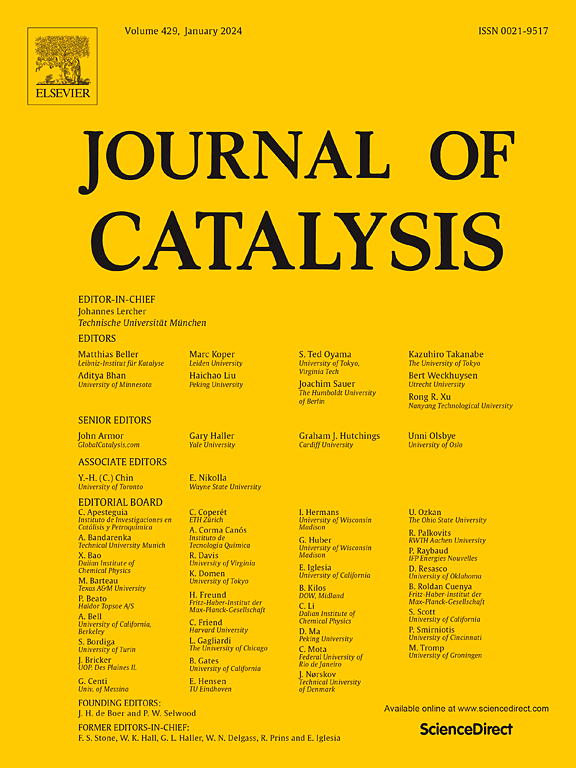A perspective of urgently required research into fundamental research into applied catalysis
IF 6.5
1区 化学
Q2 CHEMISTRY, PHYSICAL
引用次数: 0
从基础研究到应用催化亟待研究的角度
在未来的循环经济中,工业将被迫使用质量更低的原材料。因此,了解杂质在催化中的作用将变得更加重要。此外,关于化学物质注册的立法,如欧洲的REACH法规,未来将继续变得更加严厉,现在已经需要进行昂贵且耗时的毒性测试。这也将导致越来越多的替代品的压力增加。催化过程中催化剂的性能和稳定性工业上应用的催化剂有各种各样的不同形状,从流化床应用的粉末,不同大小的颗粒,特别是形状的挤出物或片剂,到扩展结构,如蜂窝状。另一方面,绝大多数学术研究都是在通常不像实际催化剂的材料上进行的。在超高真空条件下对单晶表面的研究越来越少,这表明了基础应用催化研究的未来。上述表明,在充分认识催化过程之前,还有许多基本问题需要解决。实现可持续性的愿望需要我们的工具箱取得重大进展,并努力表征催化过程。学术和工业研发的共同努力将大大有助于这一努力。要了解应用催化过程,不仅需要了解催化的基本原理,还需要了解作者贡献声明。编辑,写作-原稿,构思。格哈德·梅斯特尔:写作-评论&;编辑,写作-原稿,构思。竞争利益声明作者声明,他们没有已知的竞争经济利益或个人关系,可能会影响本文所报道的工作。
本文章由计算机程序翻译,如有差异,请以英文原文为准。
求助全文
约1分钟内获得全文
求助全文
来源期刊

Journal of Catalysis
工程技术-工程:化工
CiteScore
12.30
自引率
5.50%
发文量
447
审稿时长
31 days
期刊介绍:
The Journal of Catalysis publishes scholarly articles on both heterogeneous and homogeneous catalysis, covering a wide range of chemical transformations. These include various types of catalysis, such as those mediated by photons, plasmons, and electrons. The focus of the studies is to understand the relationship between catalytic function and the underlying chemical properties of surfaces and metal complexes.
The articles in the journal offer innovative concepts and explore the synthesis and kinetics of inorganic solids and homogeneous complexes. Furthermore, they discuss spectroscopic techniques for characterizing catalysts, investigate the interaction of probes and reacting species with catalysts, and employ theoretical methods.
The research presented in the journal should have direct relevance to the field of catalytic processes, addressing either fundamental aspects or applications of catalysis.
 求助内容:
求助内容: 应助结果提醒方式:
应助结果提醒方式:


